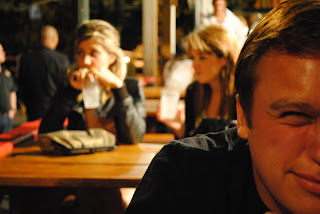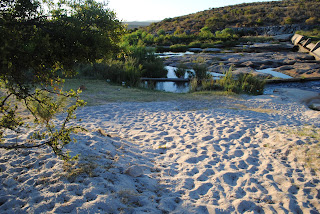Hello all! It’s been a while, I know.
This weekend was our long weekend. We had no class Friday, and planned a while back to spend it in a posh little town called Stellenbosch, about an hour out of Cape Town. Stellenbosch has the number one Afrikaans language university in South Africa, and is miles and miles of winelands. We had an absolutely fabulous time.
Thursday we left straight after class (narrowly handing my midterm paper in for Jean’s course as we zipped out of the guesthouses) and headed for the train station. Our program directors have scared the pants off of us about taking trains in Cape Town: don’t ride after 4pm, only ride in big groups, and never, ever buy anything but first class (the difference between a regular and first class ticket is only 4 rand, about 50 cents). Trains are considered by some to be “the first tragedy of apartheid” – they are a constant reminder of the apartheid government’s total control of movement, and the forced migrant labor that tore young men from their families for decades. The vast majority of people who use the train today are still black, traveling into Cape Town from the suburbs (townships) for work.
Our experience on the train was…well, it lived up to our expectations. On the way there we were semi-terrified, but fine. Found first class, managed to not be harassed, and got off at the right stop. On the way back, though, we couldn’t buy tickets in Stellenbosch because the booths were closed. A nice woman who worked at the station said we could easily buy tickets in Cape Town before leaving the station, so we boarded the train no problem. Until we got to Kaapstad. Another train worker boarded the train and told us we had to get off the train, buy our tickets, and get back on the train – and that the train would wait for us. An older black man (who I immediately trusted) told us we absolutely did not have to get off the train to buy tickets, but the train worker started screaming at us. Afraid we would get kicked off the train for not having tickets, we all (but Jackie, who waited with most of the bags) got off skeptically. About two minutes later, the train started to pull away, so we ditched the ticket man and ran back onto the train. Ten of us made it, but our poor friend Divya did not. She was held up by the man selling her a ticket (she ran initially, too, but the ticket seller told her that by law he had to give her change. She tried to escape anyway, but he pulled her back and demanded that she wait.) Seeing her left alone at the station, our friend Sam literally jumped off the moving train, barely making the end of the platform. Inertia propelled him into a wire fence that blocked the end of the platform. The train suddenly stopped; we honestly thought he didn’t make it. Then we saw him stand up, relatively unscathed. Terrified, I called Divya to make sure he really was alright. He was fine, but a hoard of men (train station workers and god knows who else) surrounded him and told him that jumping off a train was illegal, and that he was going to go to jail. In the end they just fined him R40, and they got on another train to Cape Town just 20 minutes later. But the whole experience was horrifyingly awful. Sam was a really good sport about it (“I thought I’d land on my feet,” he said) and Divya was okay, too.
On a much lighter note, Stellenbosch itself was amazingly fun. We trekked about 2 miles from the train station on Thursday afternoon (the website said a fifteen minute walk. NOT) in the blazing sun to our hostel, which was absolutely lovely. We all napped, then walked back much of the way to the town center. We accidentally ended up in the twilight zone – a small, really cheap bar that was filled with girls who looked like they were about 15. No one was wearing shoes. No one in Stellenbosch, period, wears shoes. I still don't understand why. We sat at a big picnic table on the terrace of the bar, and people-watched for hours and hours. It was hilarious and bizarre all at once, but we had a ridiculously good time.
Trying to slyly capture the weird Stellenbosch infants behind us.
Dancing to Miley Cyrus, of course. Note: Duncan being the bosch.
Andy was more than a little excited.
Friday we went on a wine tour from 10:30 am-5pm. It was great fun, but so rough. We tried over 20 wines. Our tour guide was very obnoxious. That is pretty much all I remember about this day…so here are a bunch of pictures.
On a tour of the first vineyard.
This was really high, I freaked out a little. Haha.
Grapes!
Yes, that's real.
A while ago we visited Nyanga, one of the poorest townships in South Africa. We went to Etafeni, a center developed for children infected, affected by, and vulnerable to HIV/AIDs. The center gives children an education and helps them achieve a healthy lifestyle, and parents/guardians/caretakers a place to learn concrete skills in order to enter (or re-enter) the workforce. We were there to help them paint some walls, but they gave us a tour of the place and a long time to visit and play with the children. Etafeni is a complete haven in Nyanga; it is beautifully built and landscaped, but surrounded by the worst poverty I have ever seen firsthand in my life. One girl on my program asked the man who showed us around if this stark contrast between the resource rich center and completely depleted surroundings ever posed a security threat, and his response was really surprising. He said that the center was rooted in community involvement, and it was built from the ground up by Nyanga and Nyanga alone. For this reason, he explained, people had enormous faith and pride in Etafeni, and wanted more than anything to see it succeed. They have had no major break-ins, despite the incredible violence that very immediately surrounds them. Makes you think twice about how social change really happens.
Allen the politician, reaching across the aisle.
Wearing my sunglasses! How precious.
Also last week, we were privileged to hear a poetry reading by both Antjie Krog (a very famous Afrikaans poet, who also reported on the Truth and Reconciliation Committee hearings in the late 1990s. The movie “In My Country” is based off of her book Country of My Skull) and Ingrid Fiske (aka Ingrid de Kok, my study abroad program director and also the head of the summer continuing education program at UCT). It was truly an honor to have this intimate reading.
Antjie.
Ingrid.
My 21st birthday is next week! I have no plans yet, because we have a final this week and I can’t really think beyond that yet. I am trying so hard to cherish my few moments left in Cape Town. I have fallen head over heels in love with this city!
























































